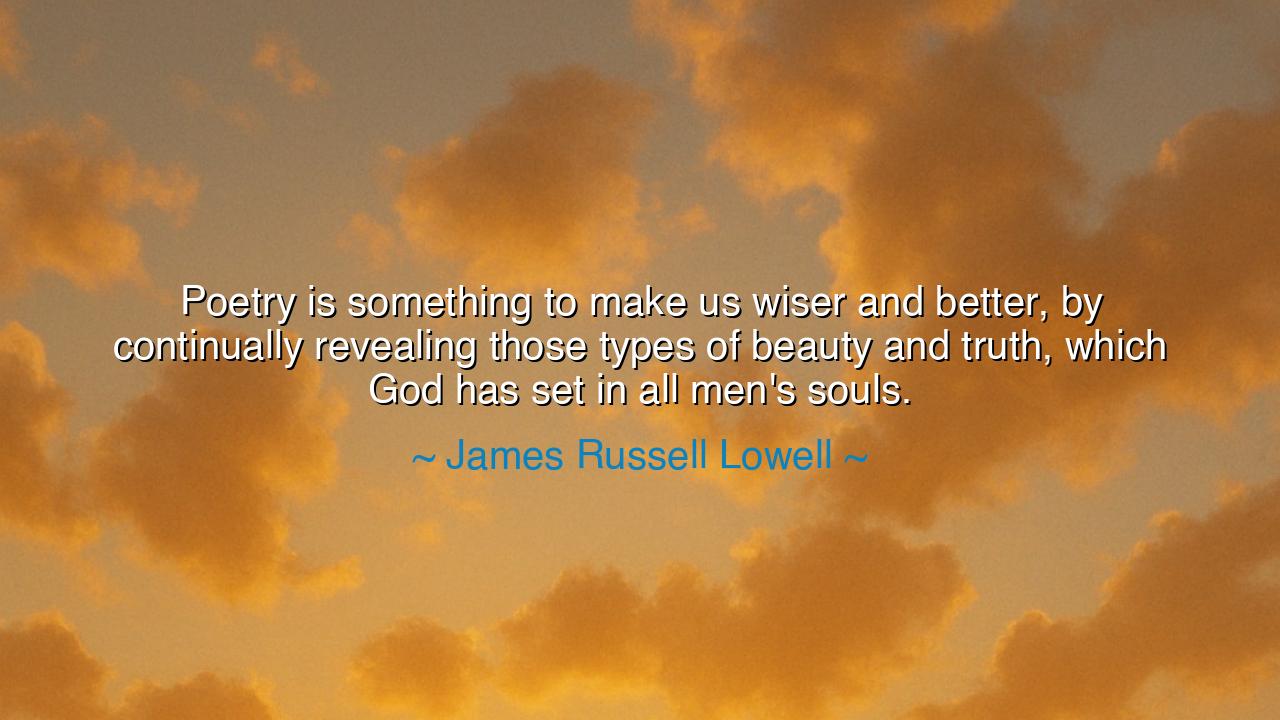
Poetry is something to make us wiser and better, by continually
Poetry is something to make us wiser and better, by continually revealing those types of beauty and truth, which God has set in all men's souls.






Hear the noble voice of James Russell Lowell, poet, critic, and prophet of the American spirit, who proclaimed: “Poetry is something to make us wiser and better, by continually revealing those types of beauty and truth, which God has set in all men’s souls.” In this declaration lies the eternal dignity of poetry—that it is not merely song, nor ornament, nor the idle play of words, but a divine instrument of awakening. Poetry, for Lowell, is a ladder between earth and heaven, by which mortals climb toward wisdom and virtue, guided by the eternal beauty and truth planted by God Himself within the human heart.
The meaning of these words is profound. Poetry is not only to delight or entertain, but to elevate. It teaches us to see more deeply, to feel more purely, to live more nobly. The beauty it reveals is not external alone—the rose, the sunset, the star—but also the inner beauty of compassion, love, and courage. The truth it discloses is not only the truth of nature, but the truth of the soul, the eternal spark within each of us. Thus poetry becomes a mirror, showing us not just what we are, but what God intended us to be.
The ancients themselves knew this. Homer did not only recount battles; he revealed the nobility of courage and the sorrow of mortality. Virgil sang not only of Rome’s founding, but of duty, sacrifice, and destiny. The Psalms of David, woven in poetry, lifted the human soul to God, revealing both despair and faith. In every age, the greatest poetry has been more than craft—it has been the unveiling of eternal things, the whisper of divinity in human words.
History also bears witness in the example of Dante. In The Divine Comedy, he painted visions of hell, purgatory, and paradise, but his greater work was to reveal truths of justice, love, and divine order. His poem did not merely entertain; it chastened, instructed, and exalted, drawing men to wisdom and humility. In Dante’s verse we see Lowell’s meaning fulfilled: poetry as a vessel of revelation, leading the soul toward God.
But Lowell also speaks to something nearer: that the seeds of beauty and truth lie in all souls, waiting to be uncovered. Poetry does not plant them, but awakens them. Each reader, each listener, carries within a spark, and when the right words strike, that spark becomes flame. Thus the power of poetry is not imposed from without, but stirred from within, like a harp-string vibrating to its own natural note. In this way, poetry unites us across nations and ages, for it touches what is universal and divine.
The lesson is clear: seek poetry not only for pleasure, but for growth. Let it not merely amuse, but instruct; let it not only charm, but change. When you read, look for the truths it awakens in you, the beauties it reveals in life and in the soul. When you write, aim not only for cleverness, but for words that ennoble, that purify, that draw forth the best in those who hear them.
Practical is this path: keep poetry near, not as luxury, but as sustenance. Read verses of the great poets as one would read scripture, letting them reveal hidden truths within your own heart. Write when you are moved, even if your words are humble, for the act itself refines the soul. Share poems with others, not as trifles, but as gifts of wisdom. For as Lowell has taught, poetry makes us wiser and better by revealing the beauty and truth God has set in all souls—and to walk with poetry is to walk closer to the divine.






NTNgan Thao
This quote makes me think about the spiritual or transcendent aspects of poetry. If poetry reveals the beauty and truth embedded in all men’s souls, what makes some poems resonate more deeply than others? Are there universal truths that all poetry uncovers, or do we each discover different kinds of truth based on our unique experiences? How can we use poetry to guide us towards better understanding of ourselves and the world around us?
QTLe Quynh Thu
I really like the idea of poetry as a way to reveal hidden beauty and truth within all of us. But what happens when someone reads poetry and doesn’t immediately connect with it? Is it because the truth isn’t ready to be discovered, or does it mean the poetry itself isn’t speaking to that person’s experience? How do we bridge the gap between the poet’s intention and the reader’s understanding?
HHhuylam huylam
Lowell’s perspective on poetry as a vehicle for wisdom and truth is beautiful, but it makes me wonder: can poetry be transformative for everyone, or does its impact depend on the reader’s openness or mindset? Does poetry really have the power to change us, or is it just a reflection of what we are already capable of understanding about ourselves? What role does the reader play in uncovering those truths?
NNn n
This quote reminds me of how poetry can act as a guide, helping us connect with something deeper inside ourselves. It suggests that poetry isn’t just for entertainment, but for personal growth, offering beauty and truth that resonate with our soul. But does this mean that all poetry, even the most difficult or abstract, has the potential to reveal beauty and truth? How do we know if we are truly perceiving that deeper meaning in the poetry we read?